Pope Francis: 'Revolution' needed to combat climate change
(CNN)As a former teacher, Pope Francis knows how to deliver a stern lecture. On Thursday, he gave one for the ages.
While slamming a slew of modern trends -- the heedless worship of technology, our addiction to fossil fuels and compulsive consumerism -- the Pope said humanity's "reckless" behavior has pushed the planet to a perilous "breaking point."
"Doomsday predictions," the Pope warned, "can no longer be met with irony or disdain."
Citing the scientific consensus that global warming is disturbingly real, Francis left little doubt about who to blame.
Big businesses, energy companies, short-sighted politicians, scurrilous scientists, laissez faire economists, indifferent individuals, callous Christians and myopic media professionals. Scarcely any area of society escaped his withering criticism.
"The Earth, our home, is beginning to look more and more like an immense pile of filth," Francis said. "In many parts of the planet, the elderly lament that once beautiful landscapes are now covered with rubbish."
Francis' bracing manifesto came Thursday in the form of an encyclical, a letter traditionally addressed from St. Peter's Square to the more than 1 billion Catholics across the globe. Derived from the Greek word for "circle," an encyclical is among the church's most authoritative teaching documents.
But Francis has set his sights far beyond the circle of his church. With an eye toward several key climate change summits scheduled for later this year, the Pope said his letter is addressed to "every person living on this planet."
"I would like to enter a dialogue with all people about our common home," Francis said.
Critique of modern life
The humble invitation belies the damning analysis of modern life contained in the 184-page encyclical, entitled "Laudato Si." The archaic Italian phrase, which means "Praised Be To You," appears in the "Canticle of the Sun," a song penned by St. Francis, the patron saint of ecology.
Subtitled, "On Care for Our Common Home," the encyclical was published Thursday in at least five languages during a news conference at the Vatican. The document was more than a year in the making, church officials say, and draws on the work of dozens of scientists, theologians, scholars from various fields and previous popes.
"We have a situation here," said Janos Pasztor, the U.N.'s assistant secretary-general for climate change, "in which science and religion are totally aligned." Pasztor was part of a team that convened with church officials at the Vatican this April.
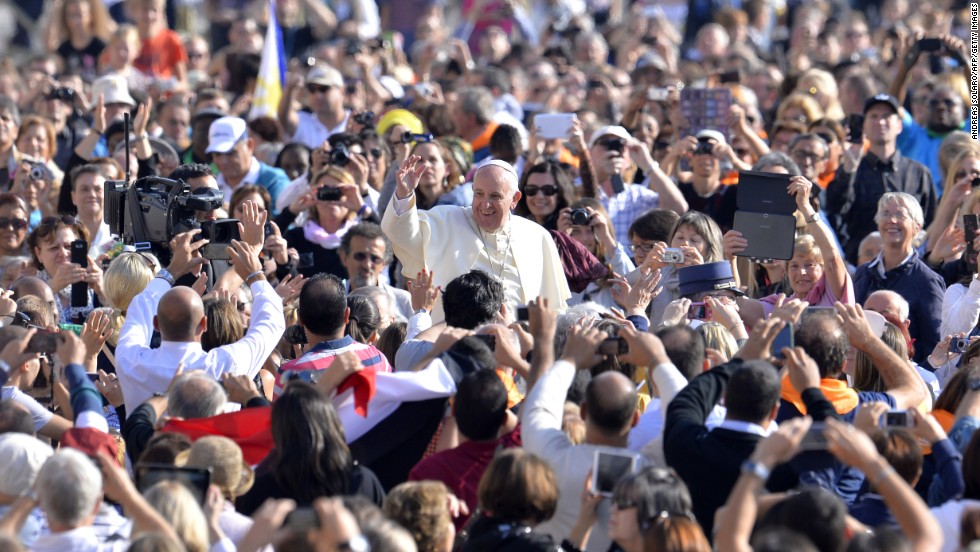
Pope Francis 34 photos
The Pope's highly anticipated encyclical recycles some of the now-familiar themes of his papacy: an abiding concern for the poor, a scorching critique of the idolatry of money and a facility for using evocative language to describe complex conundrums.
As the first Pope from the developing world, Francis brings a moral vision shaped not in the seminaries of Europe but in the slums of Buenos Aires, Argentina.
With language ranging from the majestic (lyrical poetry in praise of nature) to the mundane (take the bus!), the Pope put his signature stamp on a controversial topic and his moral clout on the line.
"Laudato si" is long on laments and short on specific solutions, though the Pope repeatedly urges deep thinking and dialogue to address the complex symptoms now plaguing the planet. In broad strokes, Francis calls for a drastic change in "lifestyle, production and consumption" from unsustainable habits to more mindful means of caring for "our common home."
"What kind of world do we want to leave to those who come after us, to children who are now growing up?" Francis asks. "The question not only concerns the environment in isolation; the issue cannot be approached piecemeal."
And while the Pope calls for practical steps like recycling and improving public transportation, he said structural injustices require more political will and sacrifices than most societies seem willing to bear.
Nothing short of a "bold cultural revolution" could save humanity from spiraling into self-destruction, the Pope warned.
Though it ends with a prayer, many parts of Francis' encyclical seem profoundly pessimistic, particularly from a spiritual leader known for his hopeful messages of mercy and openness. People no longer seem to believe that happy days lie ahead, the Pope lamented
Our care for the environment is intimately connected to our care for each other, he argues, and we are failing miserably at both.
"We are not faced with two separate crises, one environmental and the other social," Francis writes, "but rather one complex crisis which is both social and environmental."
The rich and powerful shut themselves up within self-enclosed enclaves, Francis argues, compulsively consuming the latest goods to feed the emptiness within their hearts, while ignoring the plight of the poor.
The poor, meanwhile, find themselves on the run from natural disasters and degraded habitats, shunted to the bottom of the world's pile of problems with decreasing access to its natural resources.
Francis saves his most challenging questions for modern consumers, arguing that humanity has become enamored of another apple -- and this time no Eve or serpent are around to take the fall. The temptation may have shifted from a forbidden fruit to cutting edge technology, but the sin remains the same: hubris.
"We are not God," the Pope warns, "The Earth was here before us and has been given to us."
'Bottom of the pile'
Though Popes since Paul VI in 1971 have addressed environmental degradation, "Laudato Si" is the first encyclical to focus primarily on creation care, the Christian idea that God gave humans the earth to cultivate, not conquer.
Even months before its publication, the encyclical drew criticism from conservatives and climate change skeptics, who urged the Pope not to put his moral weight behind the controversial issue of global warming.
Many Catholics and environmentalists, meanwhile, eagerly awaited the encyclical. The Washington-based Catholic Climate Covenant, for example, plans to send homily hints to the 17,000 Catholic parishes in the United States for priests to use during sermons this summer. The group is also planning media events with bishops in Iowa, California, New Mexico and elsewhere.
In the weeks before the encyclical's release, Protestant pastors and at least 300 rabbis in the United States also said they were willing and eager to embrace Pope's call for environmental justice.
A Brazilian group made even made a tongue-in-cheek trailer ahead of Francis' encyclical, portraying the pontiff of a spiritual superhero gearing for battle against the forces of evil -- energy executives.
In another sign of the anticipation awaiting the encyclical, the news that an Italian magazine had published a leaked draft of the document online on Monday made the front pages of several American newspapers.
From the first days of his papacy, Francis has preached about the importance of the environment, not only as a scientific concern but also a moral one. In his first homily as pontiff, Francis called six times during the short sermon for humans to protect creation.
The encyclical published on Thursday goes well beyond any sermons, delving into fields familiar to any Catholic, such as Scripture and theology, but also wandering into sociology, politics, urban planning, economics, globalization, biology and other areas of scientific research.
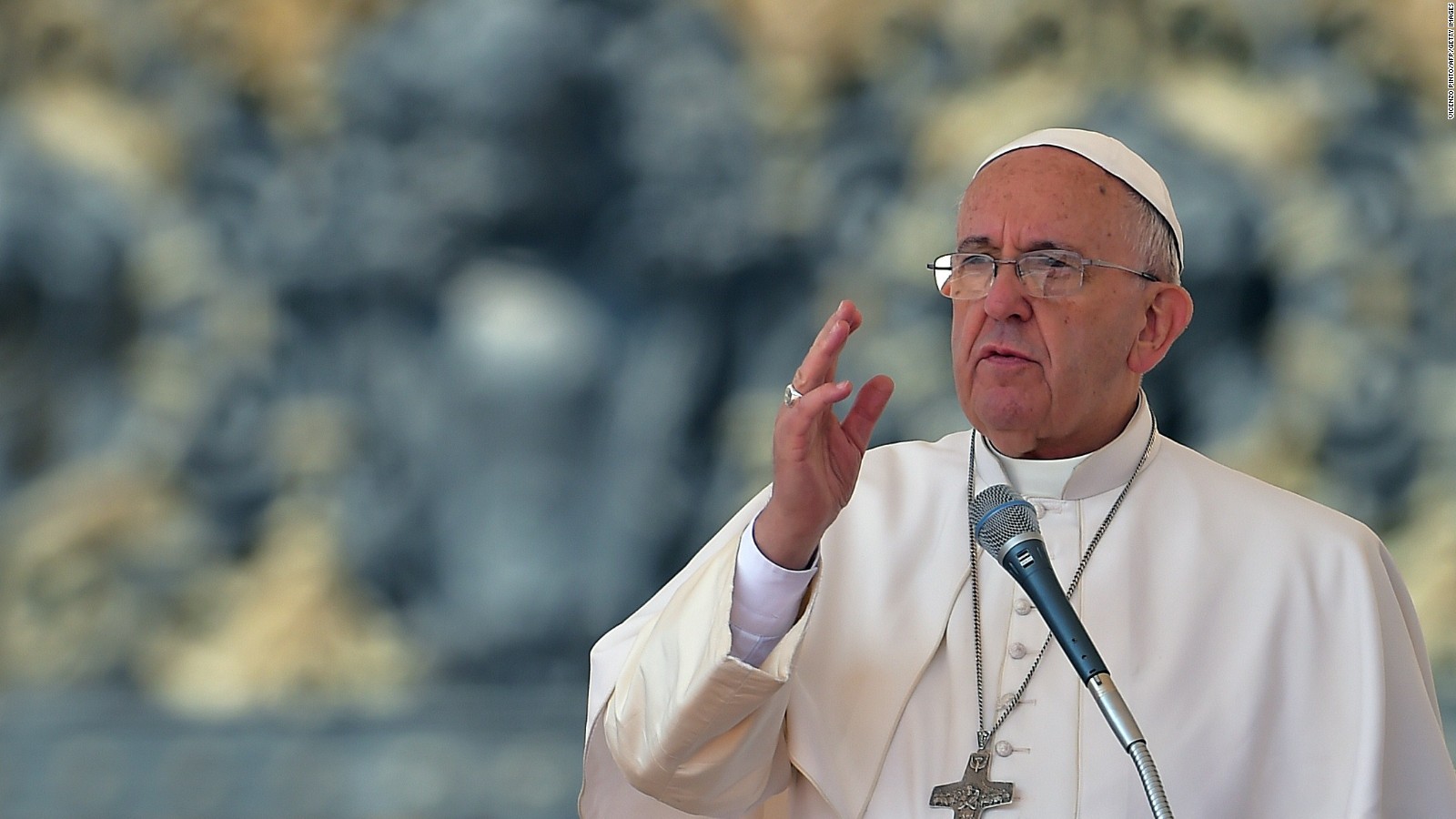
The pope has said he hopes his encyclical on the environment will reach a wide audience.
Broken into six chapters, "Laudato Si" begins by cataloguing a host of ills wracking the planet: dirty air, polluted water, industrial fumes, toxic waste, rising sea levels and extreme weather.
The problem is "aggravated," the Pope said, "by a model of development based on the intensive use of fossil fuels."
If present trends continue, Francis argued, the changing climate will have grave implications for poor communities who lack the resources to adapt or protect themselves from natural disasters.
Many will be forced to leave their homes, while the economically and politically powerful "mask" the problems or respond with indifference, the Pope said.
The poor may get a passing mention at global economic conferences, Francis says, but their problems seem to be merely added to agendas as an afterthought.
"Indeed, when all is said and done," the Pope said of the poor, "they frequently remain on the bottom of the pile."
Technology takes over
Conservatives like Rush Limbaugh called Francis a Marxist after he released another statement, called an apostolic exhortation, in 2013. In the statement, the Pope called trickle-down economics "crude" and "naive."
Limbaugh renewed the criticism on Wednesday, accusing Francis of adopting "communist way of doing things: Controlling mankind through ... governments backed by police or military power."
Apparently undeterred, the Pope doubles down on his critique of modern capitalism -- especially aspects of the free market -- in "Laudato Si."
"We need to reject a magical conception of the market, which would suggest that the problems can be solved simply by an increase in the profits of companies or individuals," he said.
What's more, the Pope called the idea that the "invisible forces of the market" can adequately regulate the economy the "same kind of thinking" that leads to the "exploitation of children and abandonment of the elderly who no longer serve our interests."
In one particularly searing section, Francis compared laissez faire economists to mobsters, drug lords, illegal organ harvesters and human traffickers. All are part of a "throwaway culture," the Pope argues, that treats human beings as just another commodity to exploit.
The Pope's attack on the "myth of progress" is more surprising. But he connected his critique to a "worshipping of earthly powers," where humans have usurped the role of God, imposing our own laws and interests on reality with little thought to the long-term consequences.
In particular, he argued that our "cult of human power" and blind adoption of technology has been a Faustian bargain, offering a wealth of benefits, but at the risk of losing our souls.
"Life gradually becomes a surrender to situations conditioned by technology," he said, "itself viewed as the principle key to the meaning of existence."
"It has become countercultural," Francis continued, "to choose a lifestyle whose goals are even partly independent of technology."
The omnipresent digital media feeds our "information overload" and "mental pollution," the Pope said. Those, in turn, lead to an excessive self-centeredness that tends to "shield us from direct contact with the pain, the fears and the joys of others and the complexity of their personal experience."
"Nobody is suggesting a return to the Stone Age," he continued, "but we do need to slow down and look at reality in a different way."
Despite his bleak view of our present situation, the Pope offered glimmers of hope near the end of his "joyful and troubling" reflection.
"Yet all is not lost," Francis said. "Human beings, while capable of the worst, are also capable of rising above themselves, choosing again what is good, and making a new start, despite their mental and social conditioning."
Getting business 'on board'
Opposition to the Pope's encyclical began several months before it was released.
In April, the Heartland Institute, a conservative group skeptical of climate change, mounted a campaign to convince Pope Francis that global warming "is not a crisis."
"The Pope is putting his moral authority behind the radical environmental agenda of the United Nations -- and he's doing it after being told only part of the climate story," Jim Lakely, a Heartland spokesman, said in an email interview on Tuesday.
Lakely said Heartland will contact "hundreds of thousands of Catholics" in the United States through mail and email countering the Pope's message and "giving them the truth about climate change."
That may be a difficult task.
More Americans trust Francis almost any other world or U.S. leader as a source of information on global warming, according to a survey conducted by Yale University and George Mason University. Still, the same poll showed that less than 10% of Americans view climate change as a moral issue.
According to a Pew Research Center study released on Tuesday, American Catholics are divided along partisan lines over climate change. More than 7 in 10 believe the planet is getting warmer, and nearly half attribute global warming to human causes. A similar number (48%) view it as a very serious problem, according to Pew.
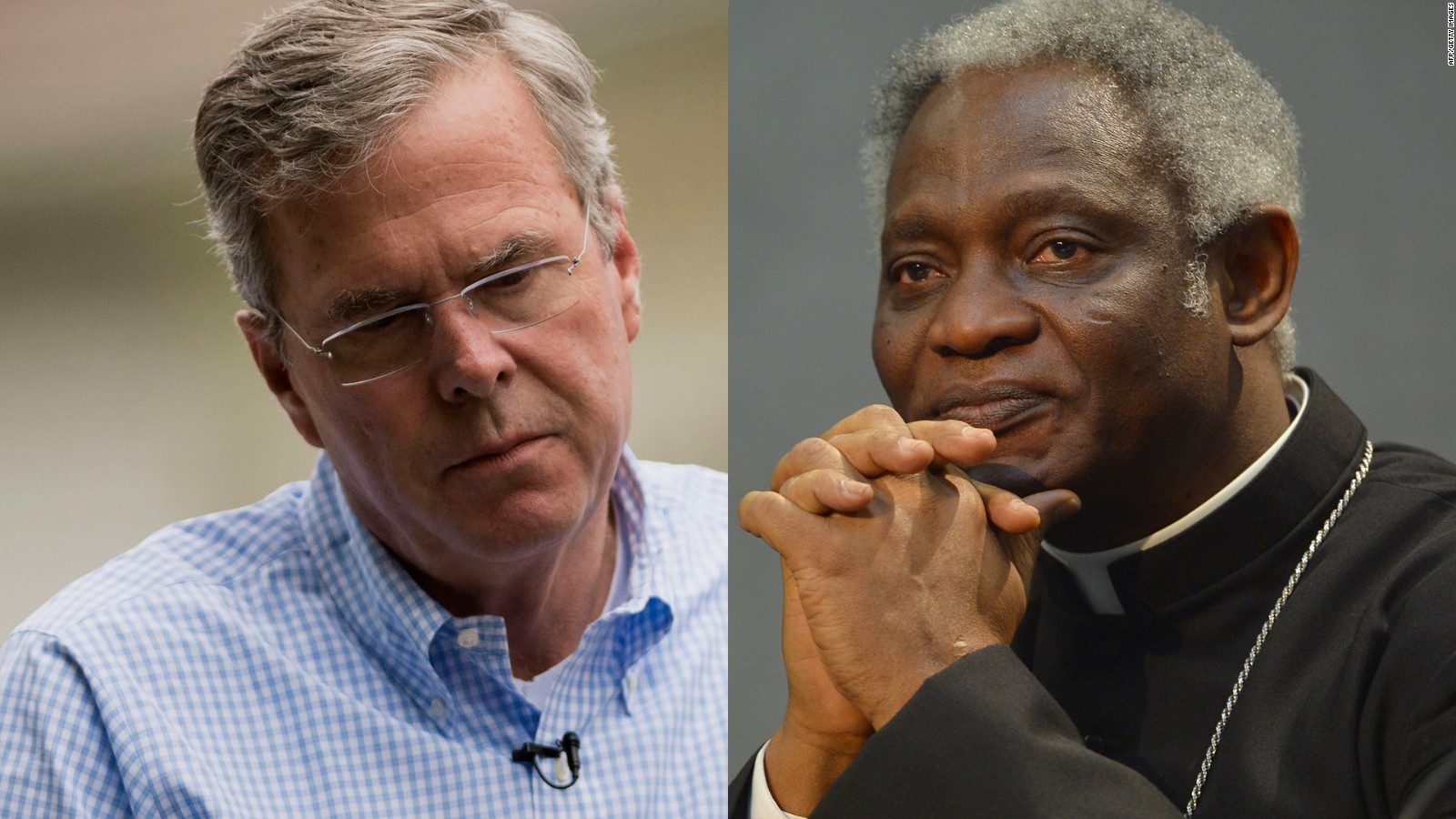
Cardinal hits back at Jeb Bush on climate 01:54
But while more than 80% of Catholic Democrats say there is solid evidence that the Earth is warming, just half of Catholic Republicans agree. And less than a quarter of Catholic Republicans believe that global warming is a man-made or poses a very serious problem.
Christiana Peppard, a professor of ethics at Fordham University, said she is not surprised that more Catholics are unconvinced that climate change presents a moral imperative.
"There's an idea that science exists in a realm separate from the way we live our lives," said Peppard, author of the book "Just Water: Theology, Ethics, and the Global Water Crisis."
But the Catholic Church has long taught that scientific facts, while reliable, don't answer deeper questions about human meaning and morality. "For that, ethical reasoning and contemplation are important," Peppard said.
On the 2016 campaign trail, though, the Pope's eco-encylical seemed to be a tough sell.
Former Pennsylvania Sen. Rick Santorum, who is Catholic, said the Pope should "leave science to the scientists."
At a town hall in New Hampshire this week, former Florida Gov. Jeb Bush, a Catholic convert, said, "I don't get economic policies from my bishops or my cardinals or my Pope. I think religion ought to be about making us better as people and less about things that end up getting into the political realm."
Other Catholics, though, were eagerly awaiting the Pope's encyclical.
In addition to Cardinal Peter Turkson of Ghana, the Vatican panel presenting "Laudato Si" included Metropolitan John of Pergamon, an Eastern Orthodox priest; John Schellenuber, founding Director of the Potsdam Institute for Climate Impact Research; Carolyn Wo, the Chinese-American director of Catholic Relief Services; and Valeria Martano, an Italian historian and member of the Rome-based lay Catholic Community of Sant'Egidio.
Woo said her assignment is to connect the encyclical's concerns to the business world.
Over the past 20 years, said Woo, former dean of the University of Notre Dame's Mendoza College of Business, some corporations have adopted more ethical approaches, and she expects a wave of letters from business leaders this week praising the Pope's initiative.
"The bottom line is that we need business, not just some, but all, to do more," Woo said. "They are the ones on the front lines. We need them on board."
The Pope will also need world leaders to buy into his moral message, which will be key before a U.N.-sponsored climate summit in December, said Pasztor of the U.N.
At the meeting, nations are expected to submit their plans for reducing greenhouse gases, and the Pope will likely repeat the encyclical's entreaties when he speaks at the U.N. General Assembly this September.
"Having such an important person as the Pope talking about this issue will reach a lot of people," Pazstor said, "and at a crucial time."









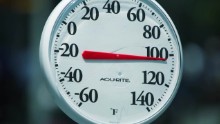
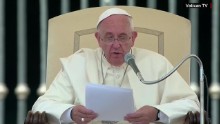
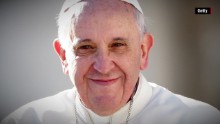
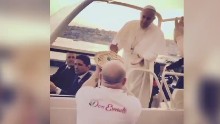




Comments